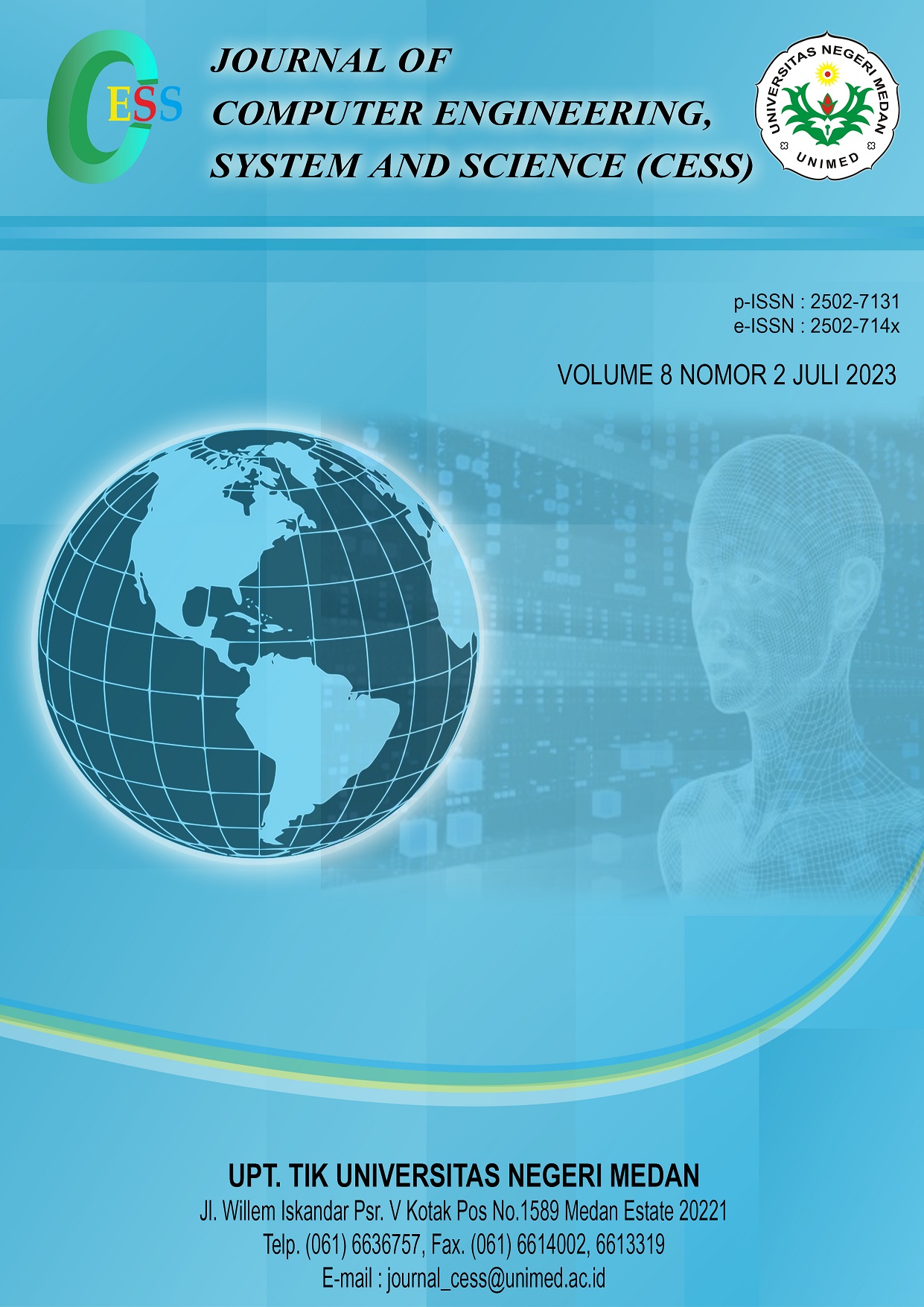Twitter Sentiment Analysis Using the Naive Bayes Algorithm in the Case of the Indosurya Savings and Loans Cooperative
DOI:
https://doi.org/10.24114/cess.v8i2.45527Keywords:
Sentiment analysis, KSP Indosurya, Naïve bayes, R Studio, Twitter.Abstract
Kasus KSP Indosurya kembali mencuri perhatian saat ini karena terduga pelaku selaku pendiri KSP Indosurya divonis bebas oleh Hakim Ketua Pengadilan Negeri Jakarta Barat atas segala dakwaan pada dengan peryataan bahwa terdakwa terbukti melakukan perbuatan yang didakwakan tetapi bukan merupakan tindak pidana, melakukan perkara perdata yang kemudian menyita perhatian publik serta mengundang reaksi masyarakat diberbagai media sosial bahkan sempat menjadi tranding topik dimedia sosial twitter Indonesia. Oleh karena itu dilakukan penelitian ini guna mengetahui dan mengklasifikasikan sentimen masyarakat pada kasua KSP Indosurya menggunakan metode Naïve bayes. Dimana hasil tertinggi didapatkan oleh sentimen negative, sehingga didapatkan kesimpulan sentimen publik terhadap topik kasus KSP Indosurya di twitter Indonesia adalah negative dengan jumlah parameter 1200 berdasarkan analisis menggunakan metode Naïve bayes.The KSP Indosurya case has again stolen attention at this time because the alleged perpetrator Henry Surya as the founder of KSP Indosurya was acquitted by the Chief Judge of the West Jakarta District Court Syafrudin Ainor for all charges on Tuesday (24/1/2023) with a statement that the defendant Henry Surya was proven to have committed an act who was charged but did not constitute a crime, carried out a civil case which then seized the public's attention and invited public reaction on various social media and even became a trending topic on Indonesian Twitter social media Therefore, this research was carried out to find out and classify public sentiment in the KSP Indosurya case using the Naïve Bayes method. Where the highest results were obtained by negative sentiment, so it was concluded that public sentiment on the topic of the KSP Indosurya case on Twitter Indonesia was negative with a total of 1200 parameters based on analysis using the Naïve Bayes method.Downloads
References
S. B. Y. G. C. Purba, œKriteria Proposal Perdamaian PKPU yang Cukup Terjamin Dalam Kasus KSP INDOSURYA CIPTA, vol. 4, no. 3, pp. 607“616, 2022.
Britney Azzahra Wiguna and Yeti Sumiyati, œPelayanan Koperasi Simpan Pinjam Kepada Masyarakat (Menurut UU Cipta Kerja & PP No. 7 Tahun 2021), Bandung Conf. Ser. Law Stud., vol. 2, no. 1, pp. 208“214, 2022, doi: 10.29313/bcsls.v2i1.703.
P. S. M. Suryani, L. Linawati, and K. O. Saputra, œPenggunaan Metode Naïve Bayes Classifier pada Analisis Sentimen Facebook Berbahasa Indonesia, Maj. Ilm. Teknol. Elektro, vol. 18, no. 1, p. 145, 2019, doi: 10.24843/mite.2019.v18i01.p22.
M. Kartika, S. Saepudin, and D. Gustian, œAnalisis Sentimen Dampak Covid-19 Terhadap Pembatalan Keberangkatan Ibadah Haji Pada Tahun 2020, J. Sains Komput. Inform. (J-SAKTI, vol. 5, no. 2, pp. 964“972, 2021.
R. W. Samsir, Ambiyar, Unung Verawardina, Firman Edi, œAnalisis Sentimen Pembelajaran Daring Pada Twitter di Masa Pandemi COVID-19 Menggunakan Metode Naïve Bayes, J. Media Inform. Budidarma, vol. 5, no. 1, pp. 157“163, 2021, doi: 10.30865/mib.v5i1.2604.
M. R. Fauzi, R. A. Pratama, P. Laksono, and P. Eosina, œAnalisis Big Data Sentimen Konsumen UMKM Sektor Kuliner Menggunakan Multi-Label K-Nearest Neighbor, J. Tek. Inform., vol. 9, no. 1, pp. 9“20, 2021, doi: 10.32832/kreatif.v9i1.3587.
M. I. Fikri, T. S. Sabrila, and Y. Azhar, œPerbandingan Metode Naïve Bayes dan Support Vector Machine pada Analisis Sentimen Twitter, Smatika J., vol. 10, no. 02, pp. 71“76, 2020, doi: 10.32664/smatika.v10i02.455.
F. A. D. Aji Prasetya Wibawa, Muhammad Guntur Aji Purnama, Muhammad Fathony Akbar, œMetode-metode Klasifikasi, Pros. Semin. Ilmu Komput. dan Teknol. Inf., vol. 3, no. 1, pp. 134“138, 2018.
A. Muzaki and A. Witanti, œSentiment Analysis of the Community in the Twitter To the 2020 Election in Pandemic Covid-19 By Method Naive Bayes Classifier Sentimen Analisis Masyarakat Di Twitter Terhadap Pilkada 2020 Ditengah Pandemic Covid-19 Dengan Metode Na I ̈ Ve Bayes Classifier, J. Tek. Inform., vol. 2, no. 2, pp. 101“107, 2021.
E. Manalu, F. A. Sianturi, and M. R. Manalu, œPenerapan Algoritma Naive Bayes Untuk Memprediksi Jumlah Produksi Barang Berdasarkan Data Persediaan dan Jumlah Pemesanan Pada CV. Papadan Mama Pastries, J. Mantik Penusa, vol. 1, no. 2, pp. 16“21, 2017.
N. Ayunandita and S. Dadi Riskiono, œPermodelan Sistem Informasi Akademik Menggunakan Extreme Programming Pada Madrasah Aliyah (Ma) Mambaul Ulum Tanggamus, J. Inform. dan Rekayasa Perangkat Lunak, vol. 2, no. 2, pp. 196“204, 2021, [Online]. Available: http://jim.teknokrat.ac.id/index.php/informatika
S. N. J. Fitriyyah, N. Safriadi, and E. E. Pratama, œAnalisis Sentimen Calon Presiden Indonesia 2019 dari Media Sosial Twitter Menggunakan Metode Naive Bayes, J. Edukasi dan Penelit. Inform., vol. 5, no. 3, p. 279“285, 2019, doi: 10.26418/jp.v5i3.34368.
R. Y. Hayuningtyas, œPenerapan Algoritma Naïve Bayes untuk Rekomendasi Pakaian Wanita, J. Inform., vol. 6, no. 1, pp. 18“22, 2019, doi: 10.31294/ji.v6i1.4685.
R. H. Bagus Muhammad Akbar, Ahmad Taufiq Akbar, œAnalisis Sentimen dan Emosi Vaksin SINOVAC Pada TWITTER Menggunakan NAÃVE BAYES dan VALENCE SHIFTER, J. Teknol. Terpadu, vol. 7, no. 2, pp. 83“92, 2021.
Downloads
Published
How to Cite
Issue
Section
License
Copyright (c) 2023 CESS (Journal of Computer Engineering, System and Science)

This work is licensed under a Creative Commons Attribution 4.0 International License.















